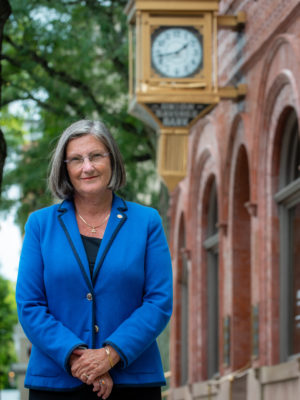USB chief, outgoing CBA Chair Cynthia Merkle: Sector strong, but 2022 could pose challenges

Cynthia Merkle says “We”™re having a good year,” she”™s not only referring to Danbury”™s Union Savings Bank, where she has been president and CEO since 2015 ”“ but also to the state”™s overall banking community.
Merkle, whose two-year term as chair of the Connecticut Bankers Association concluded in October, told the Business Journal that both the industry and USB itself appear to have come through the presumed worst of the Covid-19 era in much better shape than many had feared.
“I started my term (as CBA chair) in the middle of a hurricane, and ended it during a pandemic,” she marveled. “Let”™s say it”™s been an interesting two years.”
Merkle, who has been succeeded as chair by Michael LaBella, Connecticut market president at TD Bank Group in Trumbull, said she was “very proud” of how quickly and efficiently the organization responded at the beginning of the pandemic, both by providing up-to-date information on the ever-changing state of play within the sector and in how it worked with the state legislature.
“We communicated really well with all of our CEOs about the issues surrounding the PPP loans,” she said, recalling the rampant confusion during the early days of the Paycheck Protection Program. “It wasn”™t easy for the first few weeks.”
USB originated close to $200 million in PPP loans, with payoffs “coming through pretty strongly,” she said. “Our wealth and trust area is having a great year. As Baby Boomers are getting older, they”™re starting to think more about their retirement plans and their estates, so we”™re having one of our best years in that area. And the consumer is spending again, which is a good thing.”
Definitely not returning to pre-pandemic levels are visits to the bank”™s 26 branches ”“ something that Merkle believes will probably never happen.
“That was already on the decline pre-pandemic,” she said. “People are continuing to become more accustomed to doing their banking using technology on their computers and phones.”
Merkle asserted that USB does not plan to close any branches: “Even though customer volume is down, they”™re still our billboard. Even if someone only walks through the door two times a year, we want to provide them with the kind of financial acumen that they”™re looking for.”
She acknowledged that the bank has been at least a co-author of its shrinking branch visits, given its continued rollout of customer-friendly technology.
The latest of those, “Early Payday,” was rolled out on Oct. 13. The service, free to USB customers who have a USB personal checking account and direct deposit set up with their employer, is based on when the bank receives the direct deposit information from the customer”™s employer. If it is prior to payday, USB will make the money available to customers up to two days early.
Merkle noted that the service may also apply to direct deposits of government payments like a tax refund, unemployment benefits, Social Security, military and pension payments, and Advance Child Tax Credits. The timing of those credits again depends on when USB receives the direct deposit information, in this case from the federal government.
“A lot of people are living paycheck-to-paycheck,” Merkle observed. “The thinking is, why should that money be sitting here? We want to get them their checks as quickly as we can.”
Other recent tech offerings from USB s include contactless debit card technology, instant issuance/digital instant issuance of debit cards, and voice ID.
“Most of our digital products will be updated and revised next year to make them even more user-friendly,” Merkle affirmed.
Already being implemented are various changes to the bank”™s work environment, based on recommendations from an employee-led committee. Those include moving 30 of its approximately 370 employees ”“ most of whom have particularly long commutes ”“ to “permanent remote” status. Flex schedules can be requested in advance, and an expansion of the employee intranet service Kudos is also in the works.
Merkle said a review of the changes will take place in December.
While the current situation for the banking sector at large appears to be a positive one, she acknowledged several unknowns on the horizon ”“ including inflation. The annual inflation rate in the U.S. reached a 13-year high of 5.4% in September.
Concern over increasing inflation is not limited to customers, Merkle said. “It impacts us, too, because we”™re consumers. We buy technology, health care insurance.”
As for the Fed increasing the interest rate, Merkle said she believes it will “probably not” take place until the fourth quarter of 2022, an opinion shared by most analysts.
Either way, she said she thinks 2022 “is going to be a difficult year. There won”™t be any PPP loans being paid off, so we”™ll be back to where our margin usually is. We”™ll be automating more of our back-room processes. We really have to watch our expenses.”